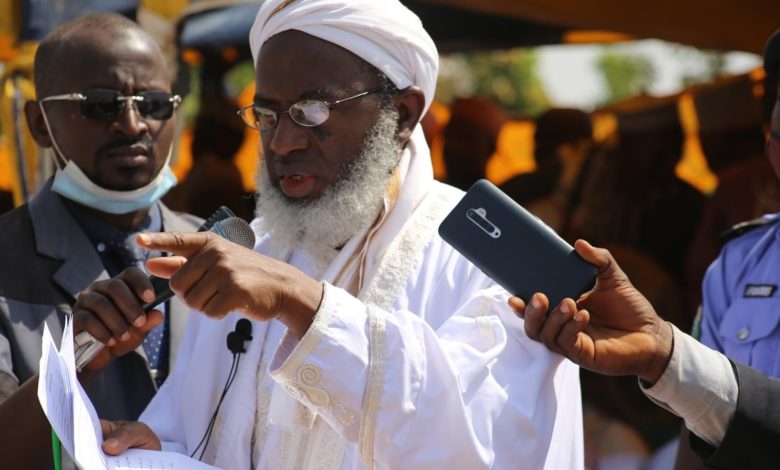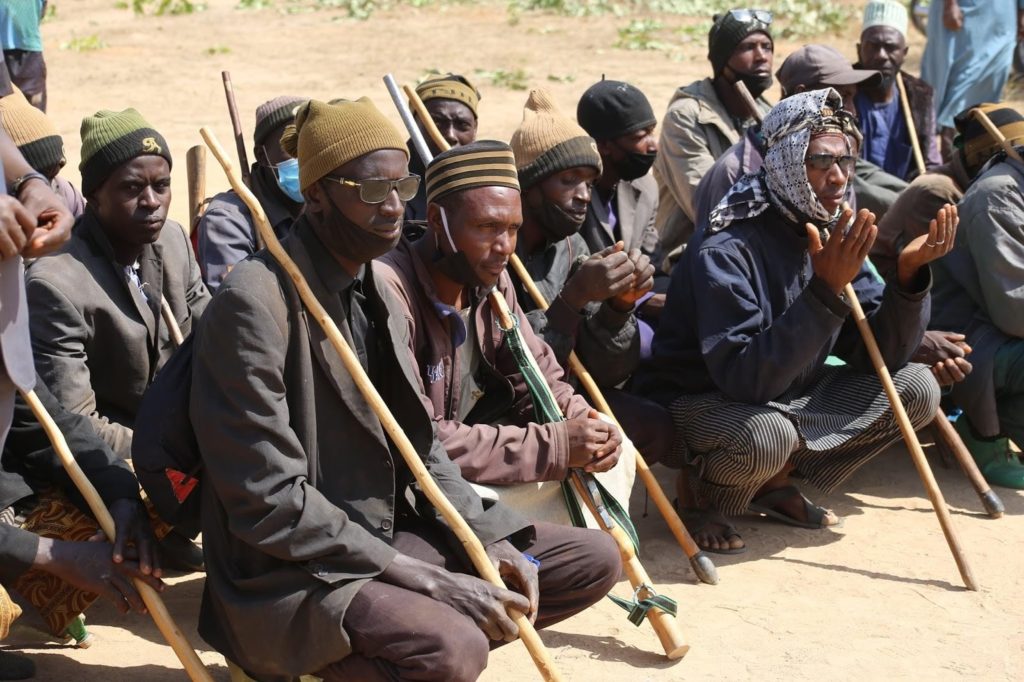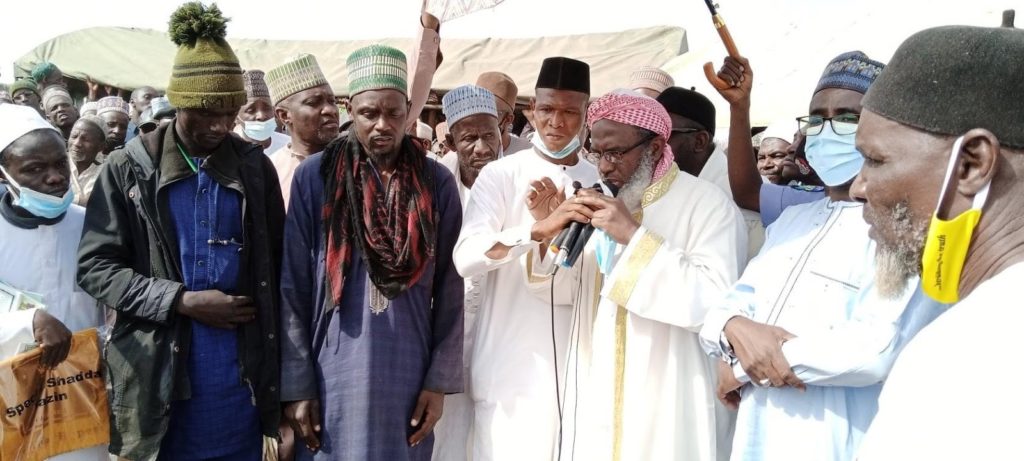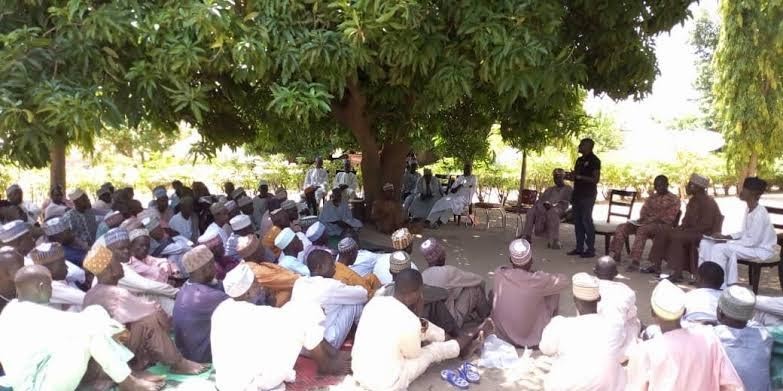
Dr Ahmad Abubakar Gumi, a renowned Islamic cleric, has started a peace mission to volatile communities of northwestern Nigeria ravaged by communal conflicts and incessant cases of kidnapping for ransom, pillage and other criminal operations.
The cleric is not ready to be deterred by any security threat. In Dec. 2020, he was threatened by the factional leader of Boko Haram, Abubakar Shekau but he began his preaching mission to the enclaves of criminals immediately.
Gumi started the mission in some towns of Southern Kaduna where incidents of hideous, cruel and senseless criminality affected hundreds of people, especially in communities along Abuja-Kaduna Highway.

The origin of conflict in the area is complex and multifaceted. However, Gumi has concentrated on the farmer-herder competition over land and water resources that triggered security deterioration not only in Southern Kaduna but in many states of the North West.
Both the Fulani herders and local farmers have been mobilising armed groups for defensive and offensive operations that resulted in the deaths of thousands and the displacement of many others.
The local farmers – seen as victims – get support from the government while the Fulani herders feel abandoned and, as a result, organise and pit against different local settlements.
According to Gumi, the nomadic Fulani feels marginalised and maligned but vents his anger in a wrong way. He feels the Nigerian authorities side with the locals and, therefore, wages a monstrous war against everyone.
“Whatever amenity you are now enjoying from the Nigerian state, be it public schools, hospital, roads, electricity, and pipe-borne water, as bad as they can be in some places or most places, the nomadic Fulani never enjoys any of that,” Gumi posted on his Facebook page.
Due to the hate speech and distrust against the Fulani, especially on the Internet, he concluded that the demonisation of a whole ethnic group as a result of crimes perpetrated by some of them added insult to the injury.
“They are truly the marginalised Nigerians. Yet, unfortunately, the most maligned,”
Preaching as a Peace Mission

The cleric believes military and police operations may not end the crisis. He once said that the nomadic Fulani are Muslims who know nothing about Islam. He believes teaching them the philosophy of Islam is a step that could lead to lasting peace.
He has taken to the philosophy of Malala Yousefzai of ending terrorism with knowledge since a gun could only kill terrorists and might create more.
The security presence in places ravaged with farmer-herder tensions yielded disappointing results. The armed gangs have continued cattle rustling, kidnapping for ransom and attacking communities.
Some state governments have taken another step and engaged in peace talks with some groups of the armed herdsmen. They were offered amnesty in exchange for dropping their arms.
However, the segregated nature of the armed groups made the amnesty program seemingly unsuccessful. The groups are not under a single leader. They are largely decentralised under different local leaders.
Gumi, as an influential cleric, intended to solve this problem and planned to meet the leaders of the nomadic Fulani himself to preach a lasting peace to all the no-go-areas of the crisis.
He visited Jere town and Kidandan – a forest linking Giwa and Birnin Gwari ravaged by communal conflicts – and addressed a large gathering of Fulani herdsmen.
In Jere, Gumi lamented the high rate of illiteracy among the Fulani herdsmen in the area and disclosed that some of them would be selected for a series of training, after which they will step down the training to their communities.
The success of his mission was recorded in Kidandan forest where, according to him, thousands of herdsmen attended the preaching session and different gang leaders promised to hand over their weapons.
Can Clerics in the North East Follow His Footsteps?

North East is the stronghold and operational theatre of Boko Haram terrorists. It is the region where the group hosted flags and instituted a short-term caliphate.
Islamic clerics, as categories of people familiar with the essential doctrines of the group, have engaged in counter-insurgency and counter-radicalisation missions in the region.
However, clerics in the region have never dared to go to the Boko Haram camps to preach peace because they are among the major targets of the group.
At the height of Boko Haram’s insurgency, particularly between 2010 and 2013, several Islamic clerics were killed, with at least 18 of these incidents officially reported.
A Central Mosque in Kano was attacked by Boko Haram in 2014 after the former Emir of Kano state, Muhammadu Sanusi II, criticised the operations of the group.
Still, experts believe that clerics can play a big role in counter-radicalisation in the northeast by working against the Boko Haram propaganda without risking their lives by going into their camps.
Support Our Journalism
There are millions of ordinary people affected by conflict in Africa whose stories are missing in the mainstream media. HumAngle is determined to tell those challenging and under-reported stories, hoping that the people impacted by these conflicts will find the safety and security they deserve.
To ensure that we continue to provide public service coverage, we have a small favour to ask you. We want you to be part of our journalistic endeavour by contributing a token to us.
Your donation will further promote a robust, free, and independent media.
Donate HereStay Closer To The Stories That Matter




